Permission Letter For Project
[Your Name]
[Your Address]
[City, State, ZIP Code]
[Email Address]
[Phone Number]
[Today's Date]
[Recipient's Name]
[Recipient's Designation/Title]
[Name of Organization/Institution]
[Address]
[City, State, ZIP Code]
Subject: Request for Project Permission
Dear [Recipient's Name],
I hope this letter finds you well. My name is [Your Name], and I am a [Your Course/Program/Designation] at [Your Educational Institution/Organization]. I am writing to seek your permission for a project that I am planning to undertake as part of my academic/organizational requirements.
Project Title: [Title of Your Project]
Brief Project Description: [Provide a concise overview of your project, including its objectives and intended outcomes.]
The purpose of this project is to [explain the significance and goals of your project in detail]. I believe that this endeavor will not only contribute to my personal and academic growth but also provide valuable insights that may be beneficial to [mention any potential benefits to the recipient's organization/institution or any relevant stakeholders].
In light of the above, I kindly request your permission to proceed with this project. Your support and authorization will allow me to access any necessary resources and materials related to the project. Additionally, I assure you that all information and data collected during the project will be handled with the utmost confidentiality and used solely for academic purposes.
I understand the importance of adhering to any rules and regulations set forth by your organization/institution, and I assure you that I will comply with all necessary guidelines throughout the project's duration.
If you require any additional information or have any specific conditions for granting permission, please do not hesitate to let me know. I am more than willing to discuss any concerns or modifications required to meet the project's objectives while aligning with your organization's policies.
I am looking forward to your positive response, and I thank you in advance for considering my request. Your support in this endeavor will be immensely valuable to me, and I am eager to contribute to the betterment of [mention relevant field or industry].
Thank you for your time and attention to this matter.
Sincerely,
[Your Name]
[Your Signature if submitting a physical letter]
Student Research Project Permission Letter
Subject: Permission Request for Research Project on [Topic]
Dear [Recipient Name/Title],
I am writing to formally request permission to conduct a research project titled "[Project Title]" as part of my [degree program/course] at [Institution Name]. This project aims to [brief description of project goals and methodology].
The research will involve [specific activities - interviews, surveys, observations, etc.] and is expected to run from [start date] to [completion date]. All participants will be informed of the study's purpose and will provide consent before participation.
I have attached my project proposal, methodology outline, and supervisor's endorsement letter for your review. I would be grateful for the opportunity to discuss this request further at your convenience.
Thank you for considering my request. I look forward to your positive response.
Sincerely,
[Your Name]
[Student ID]
[Contact Information]
Employee Project Initiative Permission Email
Subject: Request for Authorization - [Project Name] Initiative
Hello [Manager's Name],
I would like to request permission to lead a project focused on [project objective]. This initiative aligns with our department's goals and could potentially [benefits/outcomes].
Project Overview:
- Timeline: [duration]
- Resources needed: [list key requirements]
- Team members: [if applicable]
- Expected deliverables: [key outcomes]
I believe this project will contribute significantly to [specific business goal/improvement]. I'm available to present a detailed proposal and discuss resource allocation at your earliest convenience.
Best regards,
[Your Name]
[Position]
[Department]
Community Event Organization Permission Letter
Subject: Permission Request for Community Event - [Event Name]
Dear [Authority/Official Title],
I am writing to request permission to organize [event type] in [location] on [date and time]. This community event aims to [purpose and community benefit].
Event Details:
- Expected attendance: [number]
- Duration: [hours]
- Activities planned: [brief description]
- Safety measures: [security, first aid arrangements]
- Cleanup arrangements: [post-event responsibilities]
We have secured [insurance/permits] and will ensure full compliance with local regulations. Our organizing committee has experience managing similar events and is committed to maintaining community standards.
Thank you for your consideration. I am available to provide additional information or attend a meeting to discuss this request.
Respectfully,
[Your Name]
[Organization/Title]
[Contact Details]
Construction/Renovation Project Permission Message
Subject: Permission Request for [Construction/Renovation] Project
Dear [Property Manager/HOA Board/Landlord],
I am requesting permission to proceed with [specific construction/renovation work] at [property address]. This project is necessary to [reason - improvement, repair, accessibility, etc.].
Project Specifications:
- Scope of work: [detailed description]
- Contractor: [company name and credentials]
- Timeline: [start and completion dates]
- Permits obtained: [list relevant permits]
- Impact on neighbors: [noise, access considerations]
All work will be performed by licensed professionals and will comply with building codes and property regulations. I have attached architectural plans, contractor estimates, and permit documentation for your review.
I appreciate your time in reviewing this request and am happy to address any concerns or questions.
Best regards,
[Your Name]
[Property Owner/Tenant]
[Contact Information]
Photography/Filming Permission Email
Subject: Location Permission Request - [Project Title] Production
Dear [Location Manager/Property Owner],
I am writing to request permission to use [location] for a [photography/filming] project titled "[project name]". This [commercial/educational/artistic] project requires [specific location features] that your property offers.
Production Details:
- Shoot dates: [specific dates and times]
- Crew size: [number of people]
- Equipment: [cameras, lighting, vehicles]
- Scene description: [what will be filmed/photographed]
- Compensation offered: [if applicable]
We maintain comprehensive insurance coverage and will restore the location to its original condition. Our team follows professional standards and respects property guidelines.
Please let me know if you would like to review our production portfolio or discuss terms for location usage.
Thank you for your consideration.
[Your Name]
[Production Company]
[Contact Details]
Medical Research Participation Permission Letter
Subject: Permission for Medical Research Participation
Dear [Guardian/Next of Kin],
I am writing to request permission for [participant name] to participate in a clinical research study titled "[study name]" conducted at [medical facility]. This study investigates [research focus] and may contribute to improved treatments.
Study Information:
- Duration: [timeframe]
- Procedures involved: [tests, medications, visits]
- Potential benefits: [expected outcomes]
- Risks and side effects: [disclosed risks]
- Participant rights: [withdrawal options, confidentiality]
The research has been approved by the Institutional Review Board and follows strict ethical guidelines. All medical expenses related to the study will be covered, and participants may receive [compensation/benefits].
Please review the attached informed consent documents carefully. I am available to answer any questions about the study procedures or requirements.
Sincerely,
[Principal Investigator]
[Medical Degree/Title]
[Institution]
[Contact Information]
School Field Trip Permission Form
Subject: Permission Request for Educational Field Trip
Dear Parents/Guardians,
Your child has been selected to participate in an educational field trip to [destination] on [date] as part of our [subject/curriculum] studies. This trip will enhance classroom learning through [educational objectives].
Trip Details:
- Departure/return times: [schedule]
- Transportation: [bus/vehicle arrangements]
- Activities: [educational programs, tours]
- Supervision: [teacher-student ratio]
- Cost: [fees, what's included]
- What to bring: [lunch, clothing, supplies]
All students will be supervised by qualified teachers and follow school safety protocols. Emergency contact information and medical forms must be updated before departure.
Please complete and return the attached permission slip by [deadline] for your child to participate.
Best regards,
[Teacher Name]
[School Name]
[Contact Information]
What is a Permission Letter for Projects and Why Do You Need One?
A permission letter for projects is a formal document requesting authorization to conduct, participate in, or proceed with a specific project or activity. These letters serve as legal protection, establish clear boundaries, and ensure all parties understand the scope and implications of the proposed project. Whether for research, construction, events, or creative endeavors, permission letters create transparency and accountability while protecting both requesters and grantors from potential disputes or liability issues.
Who Should Send Permission Letters for Projects?
- Students and researchers seeking access to facilities, data, or participants
- Employees proposing new initiatives or changes to existing processes
- Event organizers planning community gatherings or public activities
- Property owners and tenants planning modifications or improvements
- Creative professionals requiring location access for media production
- Medical researchers involving human subjects in clinical studies
- Parents or guardians authorizing participation in educational activities
- Contractors and service providers working on client properties
To Whom Should Permission Letters Be Addressed?
- Institutional authorities such as school administrators, department heads, or research directors
- Property owners, landlords, or homeowners' associations for location-based projects
- Government officials or regulatory bodies for public space usage or permits
- Legal guardians or next of kin for participation involving minors or dependents
- Professional supervisors, managers, or executives in workplace settings
- Medical professionals or ethics committees for health-related research
- Community leaders or local authorities for neighborhood or public events
When Do You Need Permission Letters for Projects?
- Before conducting research involving human subjects, proprietary information, or institutional resources
- When planning construction, renovation, or modification projects on someone else's property
- Prior to organizing events in public spaces, community centers, or private venues
- When requesting time off or resources for workplace projects or initiatives
- Before filming, photographing, or using locations for commercial or artistic purposes
- When enrolling participants in clinical trials or medical research studies
- Before taking students on educational trips or engaging in off-campus activities
- When accessing restricted areas, confidential information, or specialized equipment
How to Write and Send an Effective Permission Letter
Start by clearly identifying yourself, your affiliation, and the specific project requiring permission. Provide comprehensive details about the project scope, timeline, resources needed, and expected outcomes. Address potential concerns proactively by explaining safety measures, compliance with regulations, and liability coverage. Include supporting documentation such as project proposals, insurance certificates, or reference letters. Use professional language while maintaining clarity and conciseness. Send the letter well in advance of your project start date to allow adequate review time. Follow up appropriately if you don't receive a response within a reasonable timeframe.
Requirements and Prerequisites Before Sending Permission Letters
- Complete project planning including detailed timelines, budgets, and resource requirements
- Legal documentation such as insurance policies, permits, or certifications
- Supporting materials like project proposals, reference letters, or portfolio samples
- Compliance verification ensuring adherence to relevant regulations and standards
- Contact information research to identify the appropriate authority or decision-maker
- Risk assessment identifying potential concerns and mitigation strategies
- Alternative arrangements in case permission is denied or conditions are imposed
- Budget allocation for potential fees, deposits, or administrative costs
Formatting Guidelines for Permission Letters
Keep letters concise but comprehensive, typically one to two pages in length. Use professional formatting with clear headers, proper spacing, and readable fonts. Maintain a respectful and formal tone while avoiding overly complex language. Structure information logically with clear subject lines and organized paragraphs. Include all necessary contact information and relevant dates. Attach supporting documents rather than embedding lengthy details in the letter body. For digital communications, ensure proper email etiquette and consider delivery confirmation options. Always proofread carefully before sending to avoid errors that could undermine your credibility.
After Sending Your Permission Letter - Follow-up Actions
Monitor for responses within the expected timeframe, typically 1-2 weeks for most requests. Send polite follow-up inquiries if you don't receive acknowledgment within reasonable periods. Be prepared to provide additional information or clarification if requested. If permission is granted with conditions, ensure full compliance and document any modifications required. Maintain copies of all correspondence for your records. If permission is denied, inquire about reasons and potential alternatives or modifications. Thank recipients promptly for their consideration regardless of the outcome. Keep stakeholders informed about permission status and any impacts on project timelines.
Common Mistakes to Avoid When Writing Permission Letters
- Insufficient detail about project scope, timeline, or requirements
- Last-minute requests that don't allow adequate review time
- Unclear objectives or vague descriptions of intended activities
- Ignoring potential concerns without addressing safety, liability, or compliance issues
- Poor presentation with formatting errors, typos, or unprofessional language
- Missing documentation such as insurance certificates or supporting materials
- Inappropriate recipients by not researching the correct authority or decision-maker
- Unrealistic expectations about approval timelines or condition negotiations
- Inadequate follow-up failing to confirm receipt or respond to requests for information
Essential Elements and Structure of Permission Letters
- Clear subject line identifying the specific request and project
- Professional greeting addressing the appropriate authority or decision-maker
- Introduction establishing your identity, credentials, and request purpose
- Project description detailing scope, objectives, timeline, and methodology
- Resource requirements specifying space, equipment, personnel, or materials needed
- Safety and compliance addressing regulations, insurance, and risk management
- Benefits and outcomes explaining value to stakeholders or broader community
- Supporting documentation referencing attached materials or additional information
- Contact information providing multiple ways to reach you for questions or follow-up
- Professional closing with appropriate signatures and formal conclusion
Tricks and Tips for Successful Permission Letters
Research the recipient's preferences, previous decisions, and organizational culture before writing. Highlight mutual benefits and positive outcomes rather than focusing solely on your needs. Use specific examples and concrete details rather than vague generalizations. Address potential objections proactively by demonstrating awareness of concerns and solutions. Build credibility through professional references, past experience, or institutional affiliations. Time your request strategically, avoiding busy periods or competing priorities. Offer flexibility in scheduling, scope, or conditions to increase approval chances. Maintain persistent but respectful follow-up without becoming pushy or demanding.

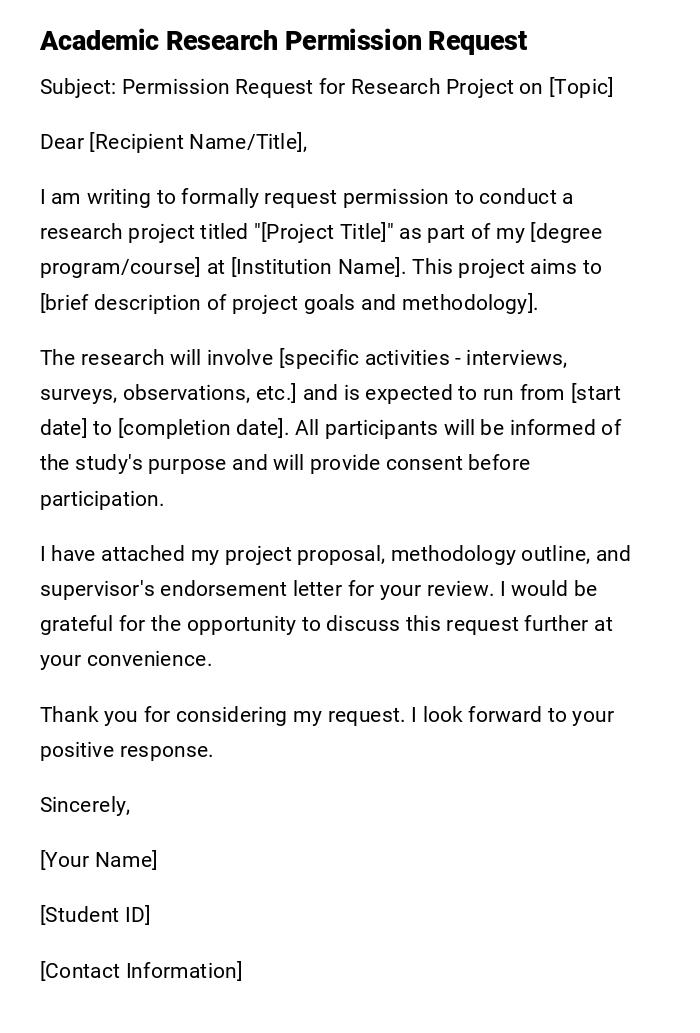
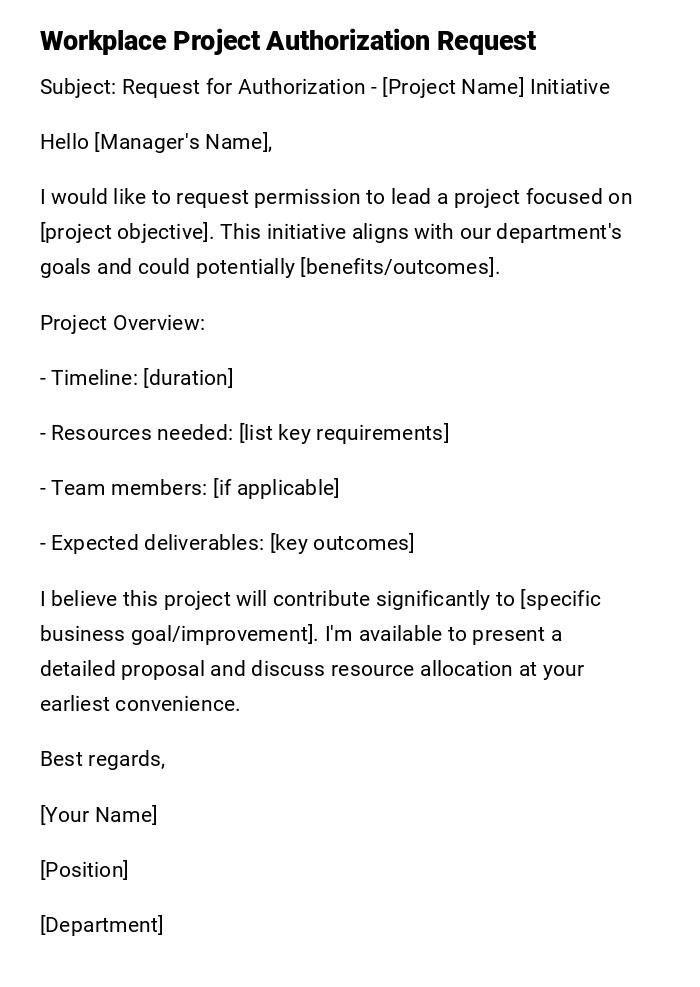
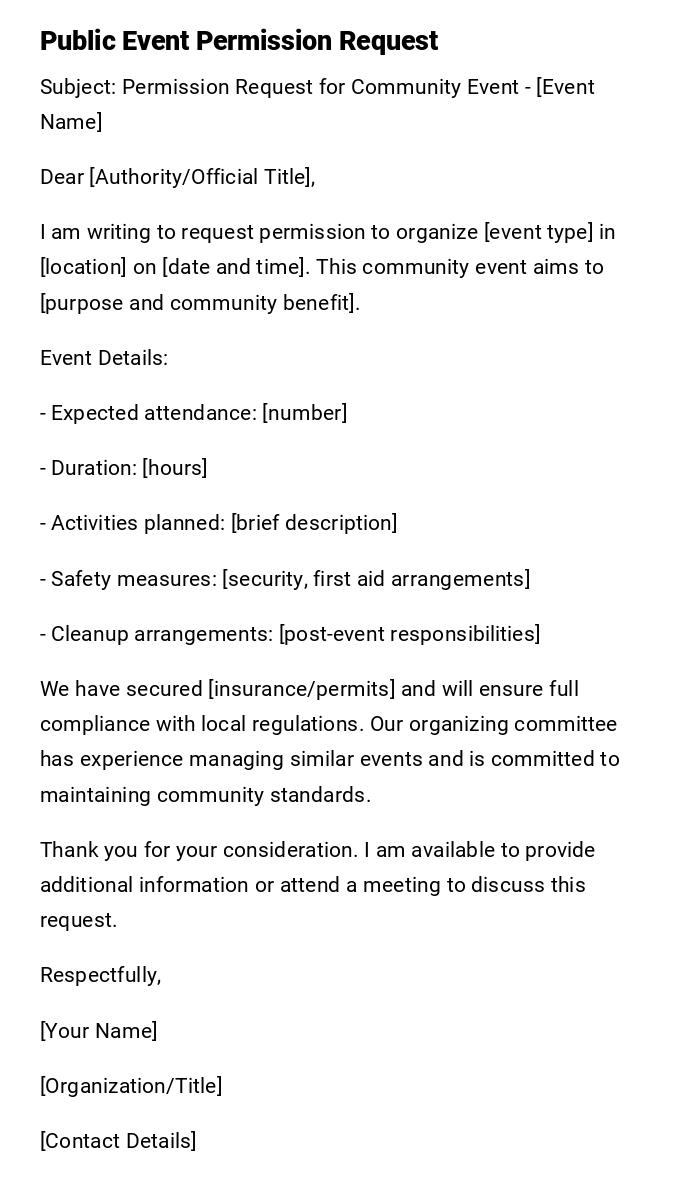
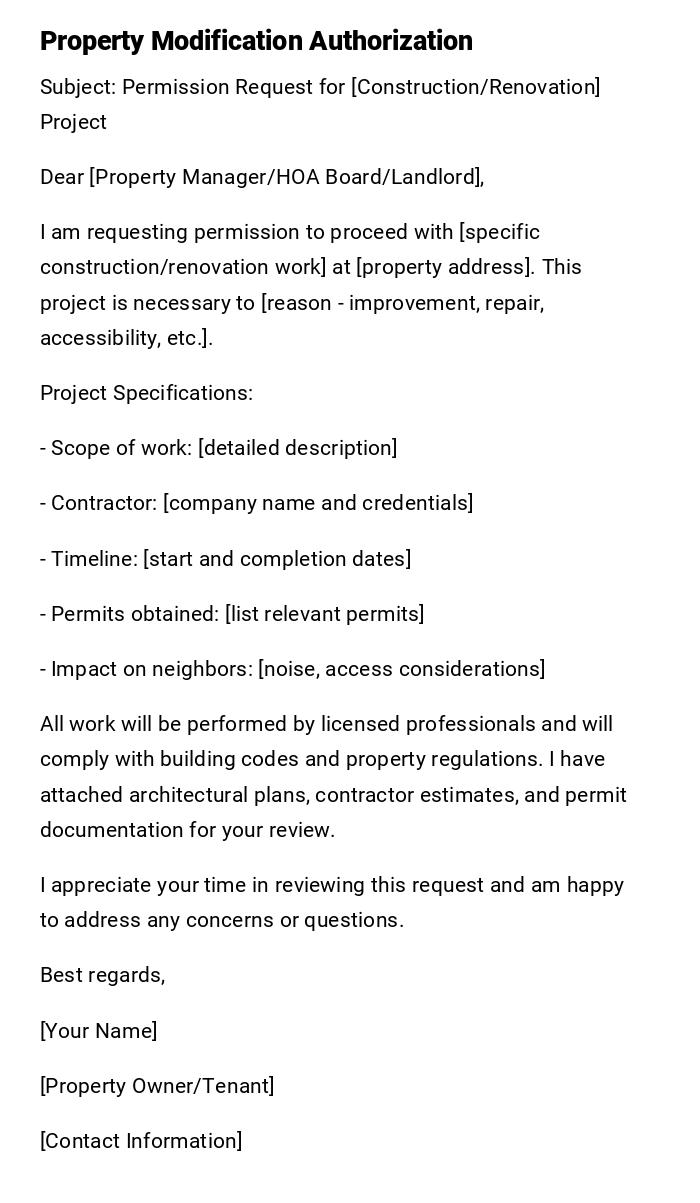
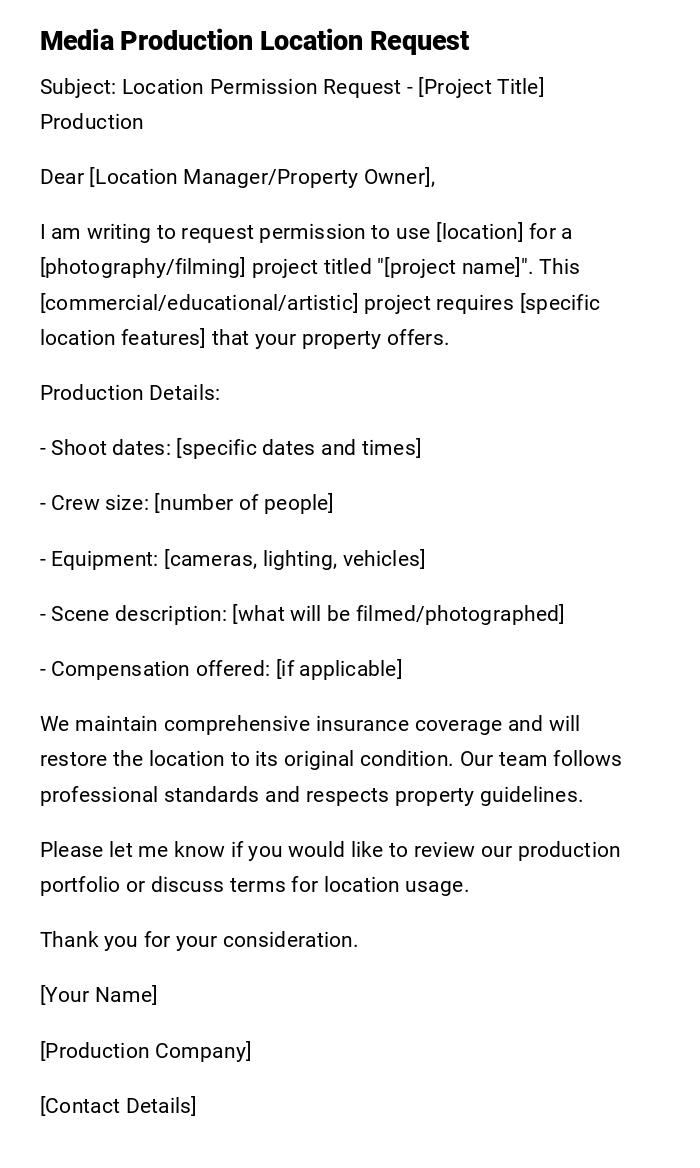
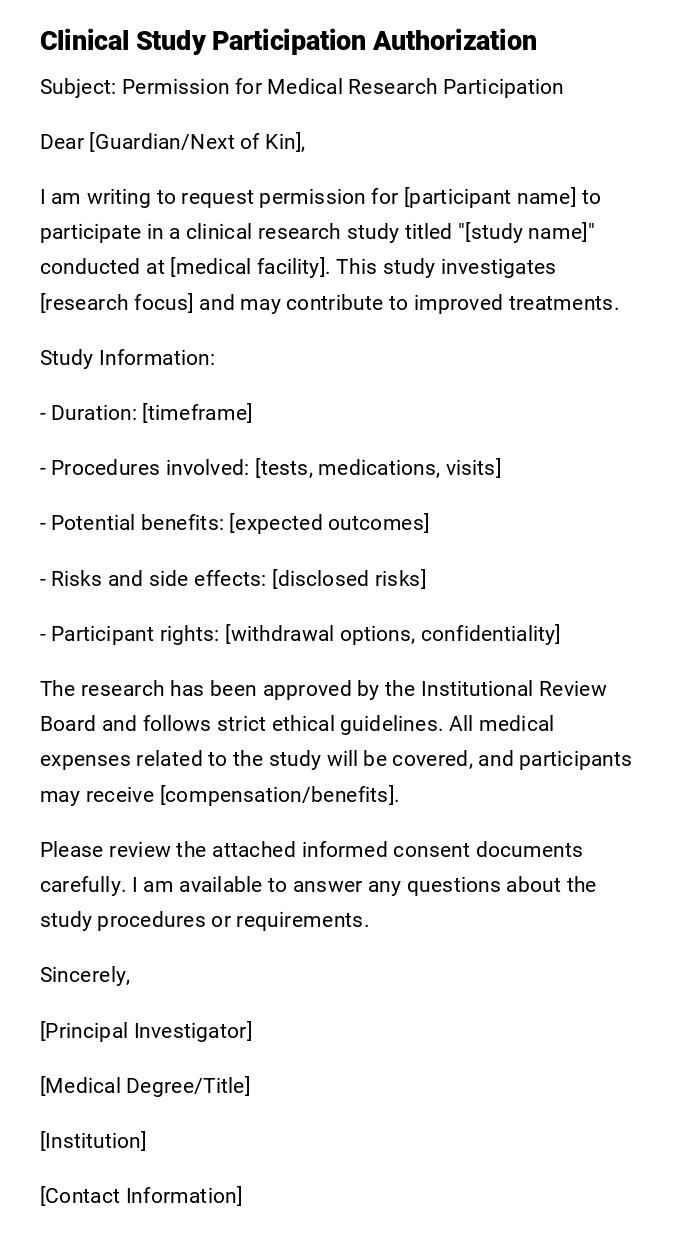
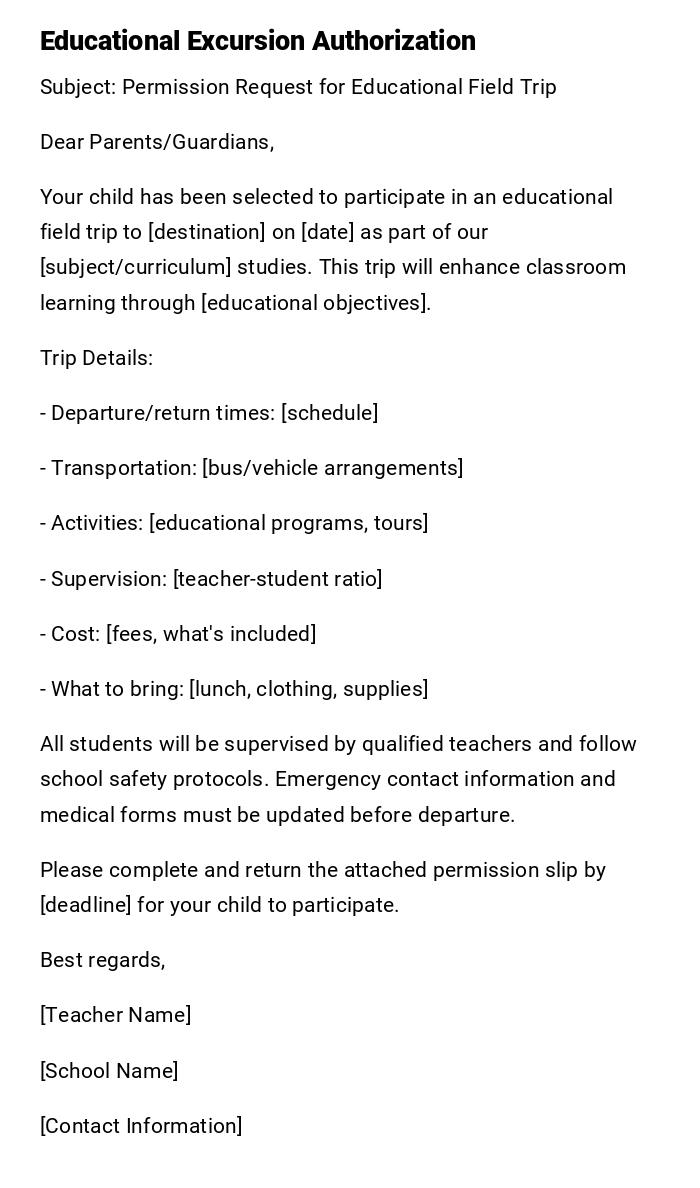

 Download Word Doc
Download Word Doc
 Download PDF
Download PDF